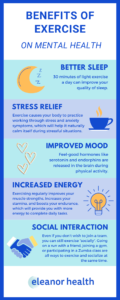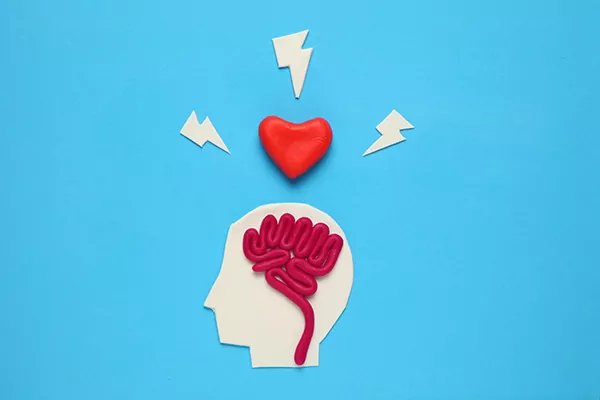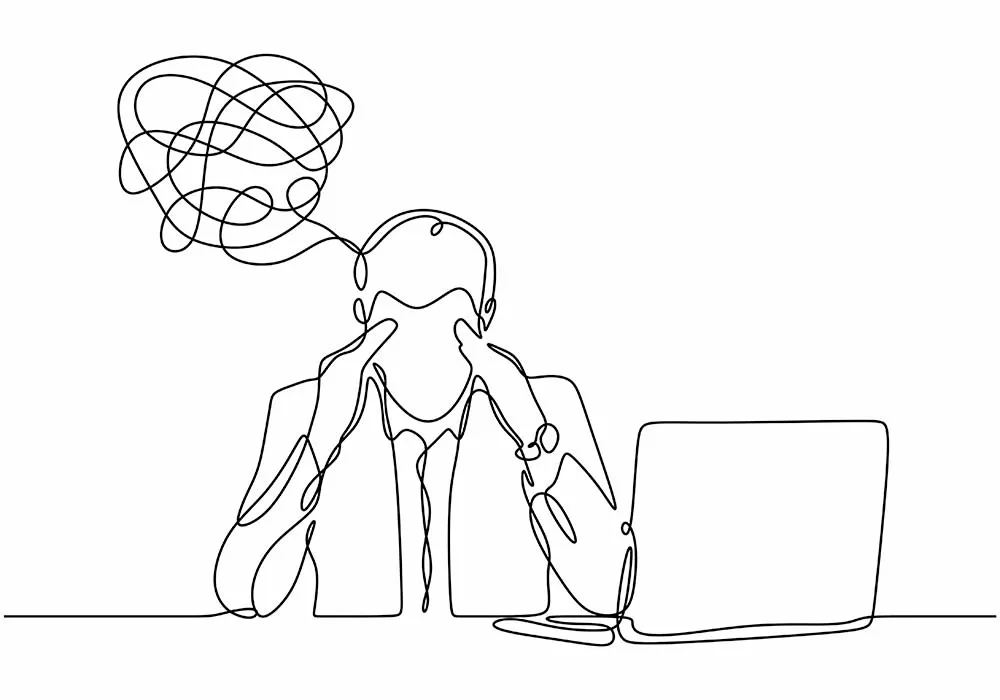Exercise is a natural part of life. It connects us not only to our bodies but also to the world around us. In modern American culture, though, it’s becoming more difficult to find the time and energy to exercise. Although “hustle culture” is at its all-time high, we seem to be hustling mentally a lot more than physically. Instead of walking, most Americans sit inside all day.
The worst part is that this sedentary lifestyle is cyclical and often reliant on our jobs. We wake up, make a quick breakfast, sit in the car on the way to work, sit behind a desk at work, sit on the drive back from work, make or pick up a quick dinner, and sit on the couch, scrolling through social media or watching TV. If we can hardly catch a break to make a meal, how can we make time for routine fitness?
This endless cycle of sitting doesn’t just strain our backs ‐ it strains our mental health, as well. The lack of physical activity and exercise is a large part of why we’re so sad, tired, and anxious. When you don’t find time to move, you’re missing out on all of the mental health benefits of exercise.
We have such a rigid view as a society of what exercise actually is. We tend to think of weightlifting or running on a treadmill at the gym as the only form of exercise. With how expensive gym memberships are (often $50 or more each month) and how much additional time it would take to drive to and from the gym, many of us opt out of this “picture-perfect” version of exercise and physical health. It’s simply not meant for us, right?
Wrong. The truth is, we can all incorporate a bit of exercise into our routines and reap its mental health benefits. All it takes is a better understanding of what the mental health benefits even are and which fitness routines are best for you, as well as some motivation to start. Despite the preconceived ideas you may have, it can be much easier than you think to exercise in a way that benefits your mental health and physical health!
In short, exercise has a multitude of benefits to many different aspects of your life. It has a direct association with improved mental health, but also indirectly positively affects mental health by improving other parts of your being. For example, exercising more often increases your stamina and energy levels. Because a common symptom of depression is feeling sluggish and lacking energy, this boost can help decrease depressive symptoms. Likewise, this newfound energy may lead you to new experiences that you never would have encountered if you hadn’t started exercising. These experiences, in turn, can positively affect your mental well-being.
The way exercise works can be compared to the “butterfly effect”‐one small change can lead to endless reactions in your life. Maybe fitness is the small change you need to make bigger changes that improve your lifestyle and mental health! Here are some of the other benefits you can gain from exercising:
Research has shown that just 30 minutes of light exercise a day can improve your quality of sleep. This doesn’t take much time to put into effect, either–individuals noticed positive changes in their sleep the very day they began exercising.
Because fitness gets you breathing hard and sweating, it imitates the effects that stress would have on your body. Although this seems counterproductive for relieving stress, exercise causes your body to practice working through these stress and anxiety symptoms. Because your body has practiced staying calm when your heart is beating and you’re breathing hard, you’ll find that it will start to naturally calm itself during actual stressful or anxiety-inducing situations.
A wealth of research has concluded that exercising regularly improves mental health and emotional wellbeing. This is because hormones like endorphins and serotonin are released in the brain during fitness activities. These hormones are often referred to as the brain’s “feel-good” hormones, because the more they are released, the better you feel. In effect, your mood becomes more positive, which of course has a positive effect on your mental well-being. Studies have shown that only 15 minutes of exercise a day reduces the risk of major depression and anxiety.
Exercising regularly improves your muscle strengths, increases your stamina, and boosts your endurance. This improves heart and lung health, which will provide you with more energy to complete daily tasks. If you find that you lack motivation and energy to get chores done, exercising may just do the trick!
A fun way that many like to exercise is through joining a recreational sports team/group. This not only gets your fitness routine in but allows you to connect with others. This is beneficial because social interaction is very important for your mental well-being. Even if you don’t wish to join a team, there are plenty of other ways to exercise “socially”. Going on a run with a friend, joining a gym where others work out, or participating in a Zumba class are all ways to exercise and socialize at the same time.
Some other benefits you can gain from exercising regularly are reduced risk of cardiovascular diseases, raised self-esteem, increased sex drive, healthy weight loss, memory strengthening, and many others.

So, you’re convinced that you want to start exercising, but don’t know where to start. Don’t worry, this is normal. Exercise can be intimidating, especially with all the articles and videos floating around the internet about how you “should” exercise. However, it is important to understand that there is no “right” exercise routine. As long as you are exercising in a way that doesn’t injure you, you’re golden!
Research has shown that rhythmic aerobic exercises are typically the most effective in improving your mental well-being. Aerobic exercises increase blood circulation in the brain and positively impact its reactivity to stress and anxiety. Some of the best types of aerobic exercises are swimming, cycling, dancing, jogging, and even gardening. All of these exercises, when performed at low-moderate intensity 3 times a week for 10 weeks, have been correlated with the improvement of anxiety and depression.
This doesn’t mean you need to go to the gym and run on the treadmill for at least 30 minutes every day to improve your mental health. Fitness doesn’t need to be rigid – you can experience its benefits by gradually incorporating some moderate-intensity exercise throughout the day. Three 10-minute sessions are proven to be as effective as one 30-minute session. Try:
If you haven’t already planned a quick fitness routine that fits into your lifestyle, here is your sign to do so! Everyone has to start somewhere, so don’t stress if you begin slow or with very short exercises. Remember, you aren’t training to become an Olympic athlete. Choose exercises you genuinely enjoy and give yourself breaks. With practice, you’ll start to see those mental health benefits coming before you know it!
Eleanor Health is here to help you build your confidence and momentum towards the future you want. We provide treatment services for adults with alcohol, opioid, and other substance use disorders. We are currently located in Florida, Louisiana, Massachusetts, North Carolina, New Jersey, Ohio, Texas, and Washington.
 5 Foods for Improved Mental Health
5 Foods for Improved Mental Health
 Mental Health and Heart Disease: Understanding the Connection
Mental Health and Heart Disease: Understanding the Connection
 5 Ways Stress Affects Your Health
5 Ways Stress Affects Your Health